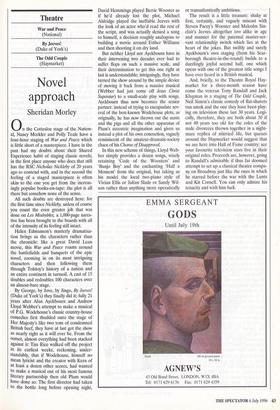Theatre
War and Peace (National)
By Jeeves! (Duke of York's) The Odd Couple (Haymarket)
Novel approach
Sheridan Morley
On the Cottesloe stage of the Nation- al, Nancy Meekler and Polly Teale have a four-hour staging of War and Peace which is little short of a masterpiece. I have in the past had my doubts about their Shared Experience habit of staging classic novels; in the first place anyone who does that still has the RSC Nicholas Nickleby of 20 years ago to contend with, and in the second the feeling of a staged masterpiece is often akin to the one you get from the increas- ingly popular books-on-tape: the plot is all there but somehow none of the sense.
All such doubts are destroyed here: for the first time since Nickleby, unless of course you count the even greater job that was done on Les Miserables, a 1,000-page narra- tive has been brought to the boards with all of the intensity of its feeling still intact, Helen Edmunson's masterly dramatisa- tion brings us the characters rather than the chronicle: like a great David Lean movie, this War and Peace roams around the battlefields and banquets of the epic novel, zooming in on its most intriguing characters and then following them through Tolstoy's history of a nation and an entire continent in turmoil. A cast of 15 doubles and redoubles 100 characters over an almost-bare stage.
By George, by Jove, by Jingo, By Jeeves! (Duke of York's) they finally did it; fully 21 years after Alan Ayckbourn and Andrew Lloyd Webber's attempt to make a musical of P.G. Wodehouse's classic country-house comedies first thudded onto the stage of Her Majesty's like two tons of condemned British beef, they have at last got the show as nearly right as it will,ever be. From the outset, almost everything had been stacked against it: Tim Rice walked off the project in its earliest weeks, reckoning, under- standably, that if Wodehouse, himself no mean lyricist and the creator with Kern of at least a dozen other scores, had wanted to make a musical out of his most famous literary partnership then old Plum would have done so. The first director had taken to the bottle long before opening night, David Hemmings played Bertie Wooster as if he'd already lost the plot, Michael Aldridge played the ineffable Jeeves with the look of an actor who'd read the rest of the script, and was actually denied a song to himself, a decision roughly analogous to building a movie around Esther Williams and then shooting it on dry land.
But neither Lloyd nor Ayckbourn have in their intervening two decades ever had to suffer flops on such a massive scale, and their determination to get this one right at last is understandable; intriguingly, they have turned the show around by the simple device of moving it back from a massive musical (Webber had just come off Jesus Christ Superstar) to a small-scale play with songs. Ayckbourn thus now becomes the senior partner: instead of trying to encapsulate sev- eral of the best-known Wodehouse plots, as originally, he has now thrown out the aunts and the pigs and all the other apparatus of Plum's eccentric imagination and given us instead a plot of his own concoction,, vaguely reminiscent of the amateur-dramatic-society chaos of his Chow of Disapproval.
In this new scheme of things, Lloyd Web- ber simply provides a dozen songs, wisely retaining 'Code of the Woosters' and 'Banjo Boy' and the enchanting 'Half a Moment' from the original, but taking as his model the local two-piano style of Vivian Ellis or Julian Slade or Sandy Wil- son rather than anything more operatically or transatlantically ambitious.
The result is a little treasure: shaky at first, certainly, and vaguely miscast with Steven Pacey's Wooster and Malcolm Sin- clair's Jeeves altogether too alike in age and manner for the paternal master-ser- vant relationship switch which lies at the heart of the jokes. But swiftly and surely Ayckbourn's own staging (from his Scar- borough theatre-in-the-round) builds to a dazzlingly joyful second half, one which opens with one of the greatest title songs I have ever heard in a British musical.
And, briefly, to the Theatre Royal Hay- market for a three-month season have come the veteran Tony Randall and Jack Klugman in a staging of The Odd Couple, Neil Simon's classic comedy of flat-sharers run amok and the one they have been play- ing on television these last 30 years. Logi- cally, therefore, they are both about 30 if not 40 years too old for the roles of the male divorcees thrown together in a night- mare replica of Arried life, but queues around the Haymarket would suggest that we are here into Hall of Fame country: see your favourite television stars live in their original roles. Proceeds are, however, going to Randall's admirable if thus far doomed attempt to set up a classical theatre compa- ny on Broadway just like the ones in which he starred before the war with the Lunts and Kit Cornell. You can only admire his tenacity and wish him luck.


























































 Previous page
Previous page